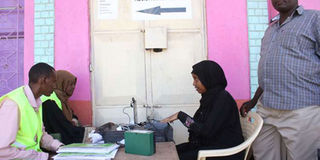Critical issues electoral team must address

Voter registration goes on in Isiolo on January 18, 2017. PHOTO | PHOEBE OKALL | NATION MEDIA GROUP
What you need to know:
The IEBC might feel bound by that decision to accept multiple registers. Such obedience to "legality" will only cause problems.
As Kenyans, we are happy to accept legal provisions only in so far as they facilitate the legitimacy of the outcome.
If legal provisions end up being illegitimate for biasing the outcome, our appeal will not be to legality, it will be to our conscience about right or wrong
The forthcoming General Election will be the most significant event this year. This election is, however, unique in the amount of attention the voter registration has attracted. This attention is important. Even more important is the attention the voter register must attract.
There is every indication the current voter register is a disaster. It is the product of an accumulated process of deliberate manipulation by numerous forces seeking to influence the electoral outcome. Some of these forces still seek to intentionally use the register to bias the electoral outcome. But others are the product of simple error.
As voters, we expect the electoral commission to rise up to the demand of exorcising all ghosts from our register, be they ghosts that seek to manipulate the election or those that are consequences of plain human error. We do accept human error as a possible explanation for a distorted voter register. But in electoral practice, human error must never surpass a certain threshold. When it surpasses that threshold, error becomes a deliberate act to distort the electoral field.
Even more important, where there is a problem with the register, be it due to error or deliberate manipulation, the electoral management body must rise up to deal with this error before we cast our ballots. This is not negotiable. It is a demand citizens must make of the management body.
CLEAN IT
In our case, the IEBC has no options around this issue of the voter register. It must not only say it is cleaning the register. It must demonstrate that it is indeed doing so. We need to be assured through specific actions that we can trust the register that will be used for the 2017 election. The IEBC must therefore not only issue statements to the effect it is cleaning the register. It must be extremely transparent in the process. The transparency of the IEBC in this process is the key to the legitimacy of the outcome of the election.
This obviously puts enormous pressure on IEBC to be independent of the political forces interested in a biased electoral process. The key demand Kenyans have of IEBC is simple: be totally independent off the opposition as much as government. I understand that this is negotiated independence in the sense that the IEBC relies on government for funding. But let us be clear; whether we support the opposition or government, we pay taxes that fund elections. So the government is not doing IEBC a favour by funding it; it is Kenyans who are funding the election.
And Kenyans were deliberately wise to make the IEBC a constitutional commission. The word "independent" was not inscribed in its title as an ornamental word. It is what gives meaning, sets the agenda and attaches a threshold of performance to the commission. Any trace of compliance to dictates from outside IEBC, be it from the opposition, government or foreign actors is a travesty against Kenyans in general. The only compliance to other forces that Kenyans will accept from the IEBC is that which enhances the fairness and transparency of the process. Period.
UNRESOLVED QUESTIONS
The first test for the independence of the current commission will be the voter register. There are unresolved questions from the 2013 General Election around the register. The Supreme Court of Kenya was cagey in its decision following the appeals against the declaration of Uhuru Kenyatta as winner of the 2013 presidential race. It allowed for multiple registers and ended up compounding the problem.
The IEBC might feel bound by that decision to accept multiple registers. Such obedience to "legality" will only cause problems. As Kenyans, we are happy to accept legal provisions only in so far as they facilitate the legitimacy of the outcome. If legal provisions end up being illegitimate for biasing the outcome, our appeal will not be to legality, it will be to our conscience about right or wrong.
Godwin R. Murunga teaches at the University of Nairobi.





